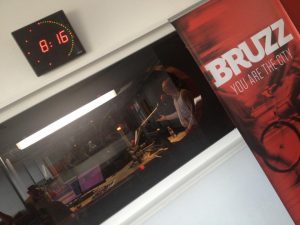Last November I was among the six finalists at the Toastmasters European Public Speaking Championships for Humorous Speeches.
They have strict criteria there. I went 30 seconds over time and was disqualified.
Some people thought I could have gone all the way – but that’s pure speculation. Either way, it was a privilege to speak in front of 400 people, a wonderful experience that has taught me much – not just about oral communication but about writing too.
Here’s a video of the speech:
And here are two big things I learned:
You have to test your products
I passed several stages to qualify for the finals in Budapest: I held the speech at five contests.
Only that it was not the exact same speech. It changed over time.
The first time, no one laughed at places that I thought funny. More surprisingly, people laughed where I didn’t expect them to. This taught me: I cannot know how people react. I may have a feeling for what works but I can’t be sure until I test it.
That happens with other modes of communication too of course and that’s why I’ve tried to be less perfectionist in recent months. I try to ask friends, peers and also customers for early feedback. And that is effective: it tells me what will work and it keeps me from going down a wrong road too far too early.
I couldn’t do it alone
On my own, I wouldn’t have made it to Budapest.
Members of my local Toastmasters club and later from other clubs worked with me to improve my speech, body language and vocal expression.
Giving a speech is a lonely act. But the preparation can be collaborative. It should be. More people have more ideas. And that is no different in writing. Writing can be a lonely act too. Yet, nothing keeps us from collecting ideas at the concept stage and, later, from asking for help to improve our drafts.
Long live friendly feedback
I don’t mean the usual approval process. There must be enthusiasm in this. Feedback can be frightening when it’s only critical. But it can be fun if the team appreciates what’s already good and if everyone shares a vision of the final outcome.
Since Budapest I try to be less shy to ask for that kind of help. And that’s a wonderful thing because people are normally happy to help if I only muster the courage to ask them. Getting early friendly feedback: I warmly recommend that.
So, back to my talk in Budapest: I want to thank everyone who helped me improve my speech. And a special thanks to Sabine Schoenangerer and Daniel Mouqué: your support has been amazing!
Photo by Wynand van Poortvliet on Unsplash





5 thoughts on “My stab at public speaking glory and what I learned on the way”
I loved your speech. As one of your ‘competitors’, I did not even have time to think ‘should I be thinking this?’, I could only laugh with you, and admire how your speech improved each time.
Continual improvement requires not just practice, but rethinking – and each new edition of your speech illustrates how to drop, add, adjust the content and the delivery. Bravo.
This is also a testament to the power of toastmasters, and the growing solidarity among the members and clubs in Belgium – together, we all get better!
Hey Jeffer,
I appreciate your words and I can only agree on what you say about the solidarity – which in your case included wonderful advice from a competitor!
I also like what you say about improvement requiring not just practice but rethinking – that’s true. Having read that now, I’ll be more aware of how important that is in the future.
Thanks Jeffer!
I loved your humour and the reaction to it was wonderful.
I had similar experience during my Standup Comedy: audience love parts that I did not find funny at the beginning and had to think ‘why’… And I had to cut some parts I loved, that was the most difficult.
Looking forward to listen to you again ‘live’.
Cutting parts you loved: it’s interesting you mention that because I also find that difficult.
It’s like in writing where they say that you have to kill your darlings!
I look forward to London. See you Saturday!
FANTASTIC Laughed so much I couldn’t work !!